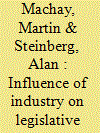| Srl | Item |
| 1 |
ID:
142104


|
|
|
|
|
| Summary/Abstract |
This article explores economic factors that help to explain Congressional support for NASA Authorization Acts and issues of U.S. federal space funding. Three economic factors related to political opportunism are identified and discussed in detail. Across the board, NASA Centers are a significant factor in shaping voting preferences, suggesting that the NASA presence itself plays an important role in influencing legislators. Meanwhile, other forms of economic opportunism based on the relative importance of the space and aircraft manufacturing industries in a given state and the amounts of NASA procurements are factors, but only in a more limited sense. This supports the concept that economic opportunism does influence legislative voting behavior on NASA Authorization Acts, though the bulk of the impact appears to be indirectly via NASA centers.
|
|
|
|
|
|
|
|
|
|
|
|
|
|
|
|
| 2 |
ID:
178250


|
|
|
|
|
| Summary/Abstract |
Candidates often highlight military experience on the campaign trail. Do they also govern differently? This study examines whether and how military experience is associated with state lawmaking. We examine legislative productivity, success rates, and the substantive content of legislation with a large original data set. The data include over 60,000 bills introduced in four state legislatures over a 10-year time span, coded for their substantive focus. It also includes information on characteristics of over 4,000 legislators. Our analysis of these data indicates that veterans do not differ in overall levels of productivity but do have common legislative agendas. Veterans’ shared legislative agendas are not narrowly confined to defense or security issues but vary depending on state context. This is, to our knowledge, the most extensive empirical analysis of the legislative behavior of veterans in a single study.
|
|
|
|
|
|
|
|
|
|
|
|
|
|
|
|
| 3 |
ID:
141641


|
|
|
|
|
| Summary/Abstract |
This article studies the interplay of U.S. primary and general elections. I examine how the nomination of an extremist changes general-election outcomes and legislative behavior in the U.S. House, 1980–2010, using a regression discontinuity design in primary elections. When an extremist—as measured by primary-election campaign receipt patterns—wins a “coin-flip” election over a more moderate candidate, the party’s general-election vote share decreases on average by approximately 9–13 percentage points, and the probability that the party wins the seat decreases by 35–54 percentage points. This electoral penalty is so large that nominating the more extreme primary candidate causes the district’s subsequent roll-call representation to reverse, on average, becoming more liberal when an extreme Republican is nominated and more conservative when an extreme Democrat is nominated. Overall, the findings show how general-election voters act as a moderating filter in response to primary nominations.
|
|
|
|
|
|
|
|
|
|
|
|
|
|
|
|